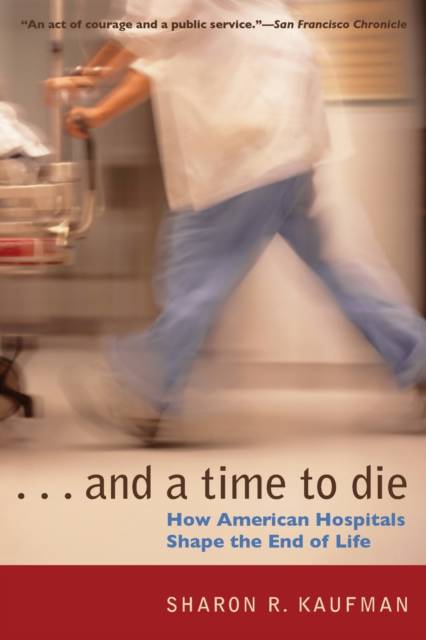
En raison d'une grêve chez bpost, votre commande pourrait être retardée. Vous avez besoin d’un livre rapidement ? Nos magasins vous accueillent à bras ouverts !
- Retrait gratuit dans votre magasin Club
- 7.000.000 titres dans notre catalogue
- Payer en toute sécurité
- Toujours un magasin près de chez vous
En raison de la grêve chez bpost, votre commande pourrait être retardée. Vous avez besoin d’un livre rapidement ? Nos magasins vous accueillent à bras ouverts !
- Retrait gratuit dans votre magasin Club
- 7.000.0000 titres dans notre catalogue
- Payer en toute sécurité
- Toujours un magasin près de chez vous
And a Time to Die
How American Hospitals Shape the End of Life
Sharon R Kaufman
Livre broché | Anglais
45,45 €
+ 90 points
Description
Over the past thirty years, the way Americans experience death has been dramatically altered. The advent of medical technology capable of sustaining life without restoring health has changed where, when, and how we die. In this revelatory study, medical anthropologist Sharon R. Kaufman examines the powerful center of those changes: the hospital, where most Americans die today. She deftly links the experiences of patients and families, the work of hospital staff, and the ramifications of institutional bureaucracy to show the invisible power of the hospital system in shaping death and our individual experience of it. In doing so, Kaufman also speaks to the ways we understand what it means to be human and to be alive. "An act of courage and a public service."-San Francisco Chronicle "This beautifully synthesized and disquieting account of how hospital patients die melds disciplined description with acute analysis, incorporating the voices of doctors, nurses, social workers, and patients in a provocative analysis of the modern American quest for a 'good death.'"-Publishers Weekly "Kaufman exposes the bureaucratic and ethical quandaries that hover over the modern deathbed."-Psychology Today "Kaufman's analysis illuminates the complexity of the care of critically ill and dying patients [and] the ambiguity of slogans such as 'death with dignity, ' 'quality of life, ' and 'stopping life support.' . . . Thought-provoking reading for everyone contemplating the fate of us all."-New England Journal of Medicine
Spécifications
Parties prenantes
- Auteur(s) :
- Editeur:
Contenu
- Nombre de pages :
- 412
- Langue:
- Anglais
Caractéristiques
- EAN:
- 9780226426853
- Date de parution :
- 15-09-06
- Format:
- Livre broché
- Format numérique:
- Trade paperback (VS)
- Dimensions :
- 154 mm x 229 mm
- Poids :
- 553 g

Les avis
Nous publions uniquement les avis qui respectent les conditions requises. Consultez nos conditions pour les avis.






